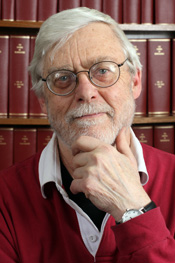Jon Kaas Festschrift 2025
Celebrating the Career of Jon Kaas
 Our Department and the Vanderbilt Brain Institute celebrated Jon Kaas on April 12th, with a whole day symposium of esteemed scholars, long-term friends, local colleagues, and Jon’s extended family. Speakers of the symposium highlighted the personal growth and encouragement they experienced while working with Jon. Leading his team of curious researchers, Jon identified some of the foundations of cortical organization in brains of many species, defining and discovering new cortical areas, and paving the way for a deep understanding of the evolutionary cornerstones of brain organization across species. Jon Kaas is widely recognized for his prolific and substantial contributions to science, earning him membership in the esteemed U.S. National Academy of Science and some of neuroscience’s most treasured awards. Yet, the day was punctuated less by the formal accolades and more by the personal stories and fateful moments of mentorship and friendship spanning decades as a researcher.
Our Department and the Vanderbilt Brain Institute celebrated Jon Kaas on April 12th, with a whole day symposium of esteemed scholars, long-term friends, local colleagues, and Jon’s extended family. Speakers of the symposium highlighted the personal growth and encouragement they experienced while working with Jon. Leading his team of curious researchers, Jon identified some of the foundations of cortical organization in brains of many species, defining and discovering new cortical areas, and paving the way for a deep understanding of the evolutionary cornerstones of brain organization across species. Jon Kaas is widely recognized for his prolific and substantial contributions to science, earning him membership in the esteemed U.S. National Academy of Science and some of neuroscience’s most treasured awards. Yet, the day was punctuated less by the formal accolades and more by the personal stories and fateful moments of mentorship and friendship spanning decades as a researcher.
It was a deeply touching event for everyone, once the proper title had been established. Leah Krubitzer (UC Davis) and Jon conspired to dub the occasion a ‘Fishfest’ to avoid the connotation of a Festschrift, which commonly honors scholars once they retire.
Far from retiring, Jon was a thoughtful and witty host. He connected with students from his early career to today, and to a broad range of visitors who came to express gratitude to Jon for his unique contributions to their personal path and scientific literature.
There was Migranka Sur (MIT), who was an early student of Jon, who highlighted how impressive it was to witness in the early 1970s. Jon had made women integral to the scientific endeavor in his lab. Mriganka described how his career has been driven by questions Jon’s lab sparked in him. About the connectivity principles endowing brains with adaptive functions, from mice to humans – and how it is imperative that they write a new paper together, still on the crucial topic of the definition of cortical areas.
There were former graduates, postdocs and collaborators of Jon’s. Each highlighted how they learned the right values, broad scholarly attitude for their own careers and how they were inspired by the deep-founded questions of Jon’s lab. These included many active and renowned scientists, including Daniel Felleman, Leah Krubitzer, Suzana Herculano-Houzel, Mary Baldwin, Ken Catania, Christina Cerkevich, Preston Garraghty, Peter Kaskan, Omar Gharbawie, Anna Roe, Patricia Gaspar, and more.
Some external admirers made heartfelt academic statements about how Jon’s work has been the foundation for better theories about the evolutionary tree by clarifying the similarity and the uniqueness of different species’ brains. Among these external scholars were Steven Wise (author of “Cortical Evolution in Primates”), Murray Sherman (author of “Functional Connections of Cortical Areas: A New View from the Thalamus”) and Asif Ghazanfar (author of “Primate Neuroethology”).
His colleagues in the department highlighted Jon’s role in shaping the department and its culture. They noted how he has supported their careers and inspired the community, whether through throwing balls into high-hanging baskets, or keeping up a happy hour tradition – for Randolph Blake, Rene Marois, Tom Palmeri, Suzana Herculano-Houzel, Ram Ramachandran and many more!
And last but far from least, there were also touching and funny biographical notes by Jon’s daughter, who helped underscore the passion and open-mindedness of Jon. Jon’s attitude to life and people made a positive impact beyond the university. At the time, there was still apparent segregation in the US, the typical biography in rural America was much more likely one of a farmer than a college graduate, and much less, an honorable member of the National Academy of Science.
Jon: For us in the department, it was an emotional and intellectual tour-de-force to witness your Fishfest. Being part of it left us with nothing more than pride and gratitude to have you as one of our fellow faculty, as one of our teachers, as one of our scientific and personal mentors, and one of our most respected collaborators!
The Fishfest-Festschrift was generously supported by the Department of Psychology and the Vanderbilt Brain Institute, and organized with crucial support from Ashley Lowther, Bianca Castellon by Suzana Herculano Houzel, Kari Hoffman and Thilo Womelsdorf.